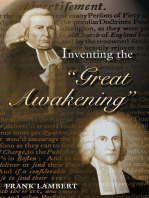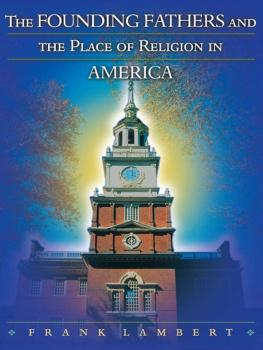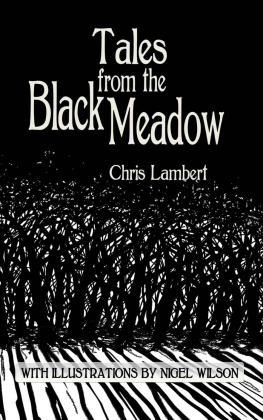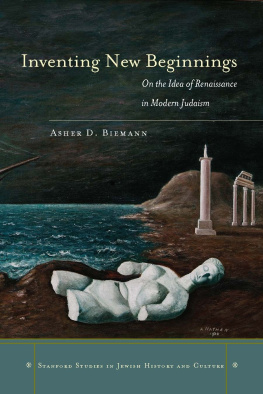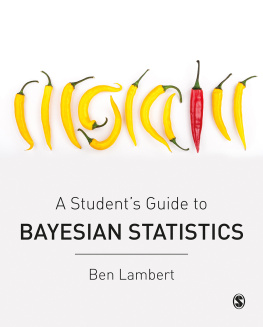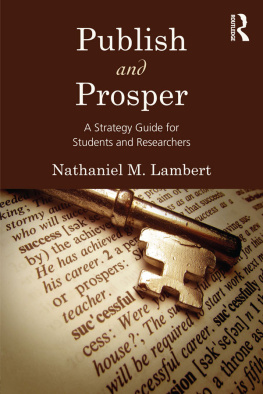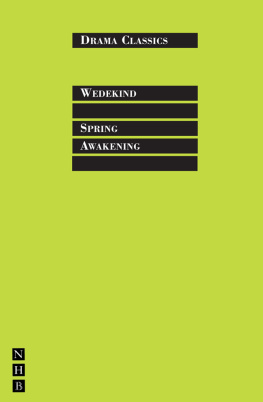Frank Lambert - Inventing the Great Awakening
Here you can read online Frank Lambert - Inventing the Great Awakening full text of the book (entire story) in english for free. Download pdf and epub, get meaning, cover and reviews about this ebook. genre: Religion. Description of the work, (preface) as well as reviews are available. Best literature library LitArk.com created for fans of good reading and offers a wide selection of genres:
Romance novel
Science fiction
Adventure
Detective
Science
History
Home and family
Prose
Art
Politics
Computer
Non-fiction
Religion
Business
Children
Humor
Choose a favorite category and find really read worthwhile books. Enjoy immersion in the world of imagination, feel the emotions of the characters or learn something new for yourself, make an fascinating discovery.
- Book:Inventing the Great Awakening
- Author:
- Genre:
- Rating:5 / 5
- Favourites:Add to favourites
- Your mark:
- 100
- 1
- 2
- 3
- 4
- 5
Inventing the Great Awakening: summary, description and annotation
We offer to read an annotation, description, summary or preface (depends on what the author of the book "Inventing the Great Awakening" wrote himself). If you haven't found the necessary information about the book — write in the comments, we will try to find it.
Inventing the Great Awakening — read online for free the complete book (whole text) full work
Below is the text of the book, divided by pages. System saving the place of the last page read, allows you to conveniently read the book "Inventing the Great Awakening" online for free, without having to search again every time where you left off. Put a bookmark, and you can go to the page where you finished reading at any time.
Font size:
Interval:
Bookmark:
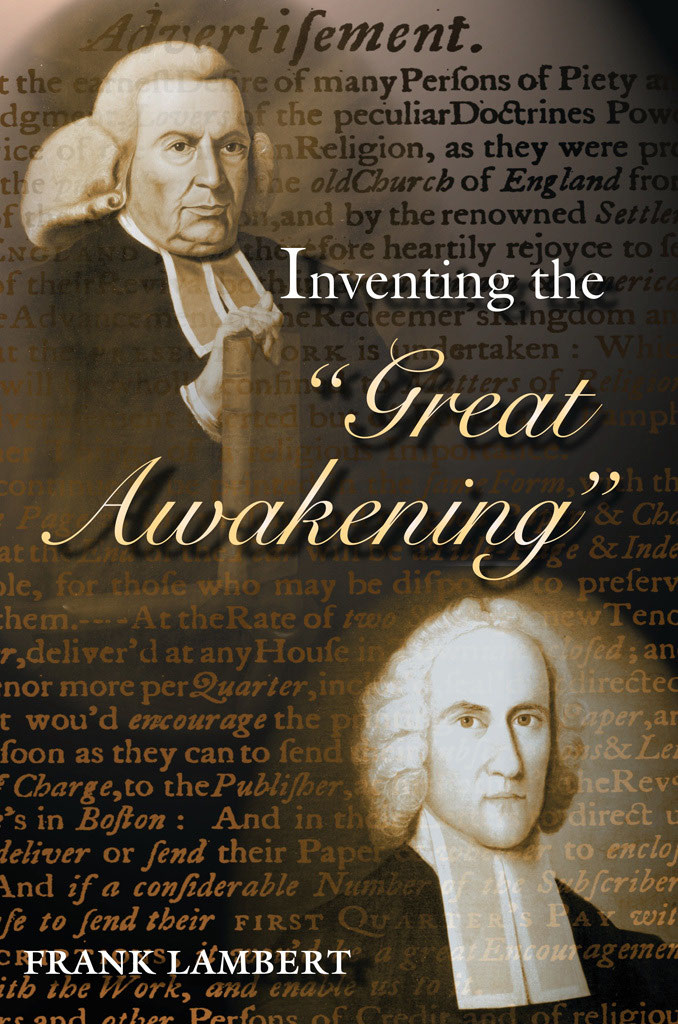
INVENTING THE GREAT AWAKENING
INVENTING THE
GREAT AWAKENING
Frank Lambert
PRINCETON UNIVERSITY PRESS PRINCETON AND OXFORD
Copyright 1999 by Princeton University Press
Published by Princeton University Press, 41 William Street,
Princeton, New Jersey 08540
In the United Kingdom: Princeton University Press,
3 Market Place, Woodstock, Oxfordshire 0X20 1SY
All Rights Reserved
Fourth printing, and first paperback printing, 2000
Paperback ISBN 0-691-08691-5
The Library of Congress has cataloged the cloth
edition of this book as follows
Lambert, Frank, 1943
Inventing the great awakening / Frank Lambert.
p. cm.
Includes bibliographical references and index.
ISBN 0-691-04379-5 (cloth : alk. paper)
eISBN 978-0-691-22399-5
1. Great Awakening. 2. RevivalsNew EnglandHistory18th
century. 3. RevivalsNew JerseyHistory18th century.
I. Title.
BR520.L36 1999
277.307dc21 98-26646
www.pup.princeton.edu
R0
For Beth
Acknowledgments xiii
Introduction 3
Notes 259
Index 295
FROM the initial musings that inspired the writing of this book, many people have made invaluable contributions to its conceptualization and execution. Tim Breen, my mentor at Northwestern and now my friend, provided much encouragement for my considering the Great Awakening in its intercolonial and transatlantic sweep. While my research has led me down unanticipated interpretive paths, and perhaps some he would not have taken, I owe much to him for suggesting a point of departure.
Throughout the process of researching and writing, I benefited from others. Purdue University provided both funds and time off for research. William M. Fowler, Jr., Editor of the New England Quarterly, granted me an opportunity to test my thesis in that journal. He and Coeditor Linda Smith Rhoads have granted permission to reprint portions of my article, The First Great Awakening: Whose Interpretive Fiction? New England Quarterly 68 (December 1995): 650-659.
At times humbling, occasionally painful, but always instructive, the vetting process contributed greatly to my work, forcing me to justify assumptions, reexamine evidence, clarify arguments, and rethink conclusions. Without doubt, this book is better for the careful, critical scrutiny of outside readers. I am indebted to Virginia Anderson (Colorado), John Murrin (Princeton), and Mark Noll (Wheaton) for their probing questions and trenchant insights.
I also owe much to Brigitta van Rheinberg, Editor of History and Classics at Princeton University Press. Repeatedly, she demonstrated the value of a good editor. In guiding the project from first draft to publication, she pushed for broader, clearer conceptualization while providing encouragement and reassurance. And, because of the superb professional skills of text editor Lauren Lepow, the final version exhibits greater clarity and grace. I, however, take responsibility for any remaining textual or factual errors.
Finally, I owe a special debt to my family, my wife, Beth, and sons, Talley and William. They were gracious, and often critical, listeners to far too lengthy discussions of various arguments and pieces of evidence. They bore it with good humor and steadfast support, proving that familial love can endure all.
FOR a brief time in the early 1740s, religious events dominated the news in colonial America. Prime newspaper space usually devoted to matters emanating from statehouses contained the latest developments from meetinghouses. Weeklies from Boston to Charleston reported the huge crowds, often numbering in the thousands, that gathered at outdoor preaching services. Observers at those meetings described bizarre behavior including Out-Cries, Faintings and Fits as men and women reacted to frightening depictions of eternal damnation. Reporters noted the presence of persons who had theretofore rarely attended Christian churches. Joseph Park, minister at Westerly, Rhode Island, recorded that while there were not above ten or twelve Indians that used to come to Meeting at all,... there is now near an Hundred that come very constantly. Others, who had formerly attended worship but paid little attention to sermons, suddenly began to take heed. John Tennent, pastor at Freehold, New Jersey, indicated that many who had previously gone to church for their Diversion, viz. To hear News or speak to their Trades-Men, now were taken in the Gospel Net. And concern about religion spread into regions once considered barren of spiritual sensitivities. Samuel Blair of New Londonderry, Pennsylvania, offered a joyful, though chauvinistic, portrayal of religious changes occurring in neighboring Maryland: Several even in Baltimore... who were brot up almost in a State of Heathenism... afford very satisfying Evidences of being brought to a saving Acquaintance with God in Jesus Christ.
What was going on is a question that elicited much comment from contemporaries and continues to intrigue historians. Extensive coverage suggests that men and women of the time regarded these unusual occurrences as a major event in mid-eighteenth-century colonial America. Even after war erupted in 1739 between England and Spain, with fighting raging in the Americas, religious news remained on the front pages of colonial newspapers. But the reportage alone fails to provide a clear, unambiguous account of what exactly was happening, and what was behind it. Commentators soon emerged, however, to offer answers. Seizing the initiative was one group of evangelicals, hereafter referred to as revivalists. They offered their explanation of the event through a series of interpretive narratives that appeared in print almost as quickly as the events that inspired them unfolded. They claimed to discover in the scores of reported incidents a single event, one they called the remarkable Revival of Religion. Moreover, these writers insisted that what they described was an extraordinary Work of God. Though God was always at work redeeming fallen humankind, they contended that on rare occasions he dispensed his mercy in unusual outpourings. These narrators, primarily ministers, heralded the great awakening they were witnessing as one of those special moments previously seen only at Pentecost and during the Protestant Reformation. Sensitive to suggestions that human actions instead of divine inspiration lay behind the revival, they insisted that they were discoverers, not architects, of the events they reported.
American evangelicals had witnessed revivals before, but they proclaimed this one to be different. William Cooper, a Boston minister and revival promoter, differentiated between what he witnessed in the 1740s and previous local awakenings. Scope was one distinction. Unlike earlier local awakenings, this revival was, according to Cooper, truly extraordinary in respect of the extent of it. While New England had witnessed the outpouring of Gods spirit before, this manifestation was more or less on the several provinces [of British North America] that measure many hundred miles on this continent. In other words, he regarded this great awakening as intercolonial, an American revival before there was an American nation. And he found noteworthy the uniformity of the work. He concluded from testimonies in letters, and conversation with ministers and others who live in different parts of the land where this work is going on, [that] it is the same work that is carried on in one place and another. Local circumstances were as varied as in previous revivals, but revivalists saw unity in awakenings occurring in diverse communities separated from each other by great distances. They witnessed the same Spirit at work, the same sudden outburst of awakening, the same rapid spread of the revival, and the same effects on people.
Next pageFont size:
Interval:
Bookmark:
Similar books «Inventing the Great Awakening»
Look at similar books to Inventing the Great Awakening. We have selected literature similar in name and meaning in the hope of providing readers with more options to find new, interesting, not yet read works.
Discussion, reviews of the book Inventing the Great Awakening and just readers' own opinions. Leave your comments, write what you think about the work, its meaning or the main characters. Specify what exactly you liked and what you didn't like, and why you think so.

